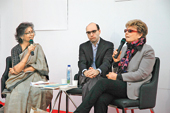 |
| Dacia Maraini (right) in conversation with Mandira Sen (left) at the Book Fair as the Italian consul-general Joel Melchiori looks on. (Sanat Kumar Sinha) |
This is Dacia Maraini’s fifth visit to India and the first to Calcutta. “I am here to attend the Book Fair and I think the fair is incredible,” said the 75-year-old author. The Italian writer found it similar to the book fair in Turin where “people come, look, touch and buy books”.
What she found completely unacceptable was the prevalence of hand-pulled rickshaws.
“How can you put a man in place of a beast to pull another person along on the road?” she shuddered. Dacia herself had a traumatic childhood, when she was incarcerated in a concentration camp in Japan for two years. “It was terrible, the Japanese didn’t give us enough to eat, they gave us no vegetables, no fruit, no fish, nothing. After a couple of months, I and my little sister had beriberi, weakness, anaemia. I couldn’t stand, I walked like an animal. My parents went on a hunger strike to protest against this. My father told the guards, ‘The children are not guilty, you cannot treat them as prisoners of war’. But the guards said we were the children of traitors. Then one day, my father, who was an anthropologist, knew about a Samurai ritual where, if a person cut off his finger and threw it at his opponents, he commanded respect. So, my father axed his finger and threw it at the guard. The guard was furious but after a week, he came with a goat and its milk saved us,” she said.
Dacia plans to write about this experience “before I die” but hasn’t got around to writing it yet because “there is some kind of refusal to recall such a traumatic experience”.
Maraini found Italian law strongly biased against women. Tracing the feminist movement in Italy, she said: “In Italy now laws have been changed to give more equality to women, at least on paper. Earlier in the 60s, a wife had to ask for written permission from the husband if she were to undertake a journey or decide to do something. Female adultery was persecuted by law but not male adultery. If a woman was raped, she couldn’t make an accusation, because she was not the person who was offended. What was offended was public morality. All this was changed only in the 1980s. We had no divorce, no legal abortions. We changed all that.”
Her last novel, published two months ago, La grande festa, is about the relationship with death. “I wrote about the people whom I loved but have gone away, my sister, who went away young, my father, my companion,” she reminisced. After her first marriage fell through, Dacia was a companion of Alberto Moravia, the Italian novelist, living with him from 1962 to 1983. Moravia passed away in 1990. “It is a confrontation between the idea of death that you have in the eastern countries and what we have. I think of your ritual of cremation as having a direct relation with death. We, instead, put our dead in the coffin and put it down. It’s as if we are afraid of death. Why do we put so many nails in the coffin?” feels the author.
In peasant society, all family members would gather around the dying person. “Now death is solitude, you are left alone to die in a hospital with machines. Our society has a fetish for the young, beautiful and productiveness. If you are not young or beautiful or productive, you are useless. Old people are just waiting to die,” says the author.










